Unit 2 Arnwick was a city with 200,000 people.课件
文档属性
| 名称 | Unit 2 Arnwick was a city with 200,000 people.课件 |
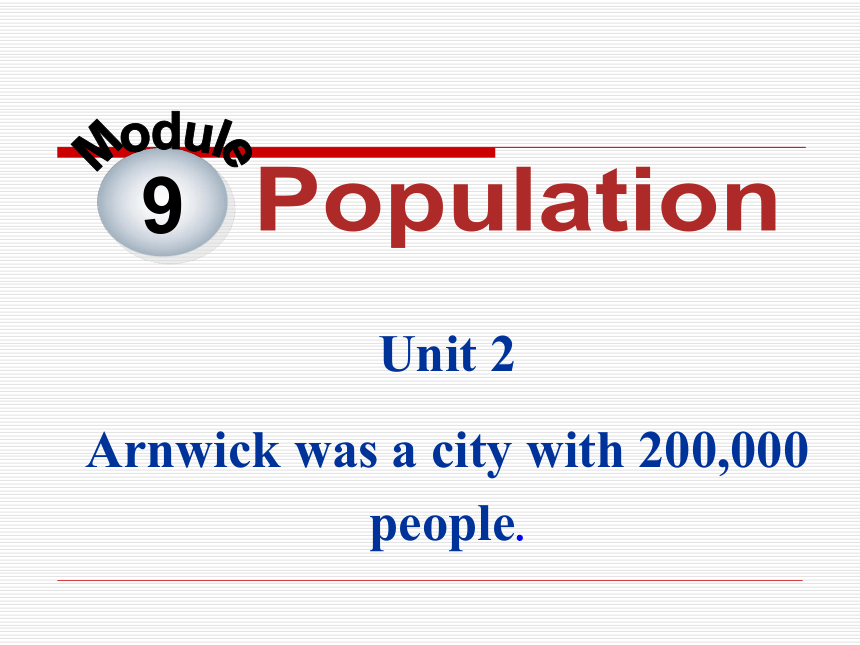
|
|
| 格式 | zip | ||
| 文件大小 | 1.0MB | ||
| 资源类型 | 教案 | ||
| 版本资源 | 外研版 | ||
| 科目 | 英语 | ||
| 更新时间 | 2013-11-22 00:00:00 | ||
图片预览

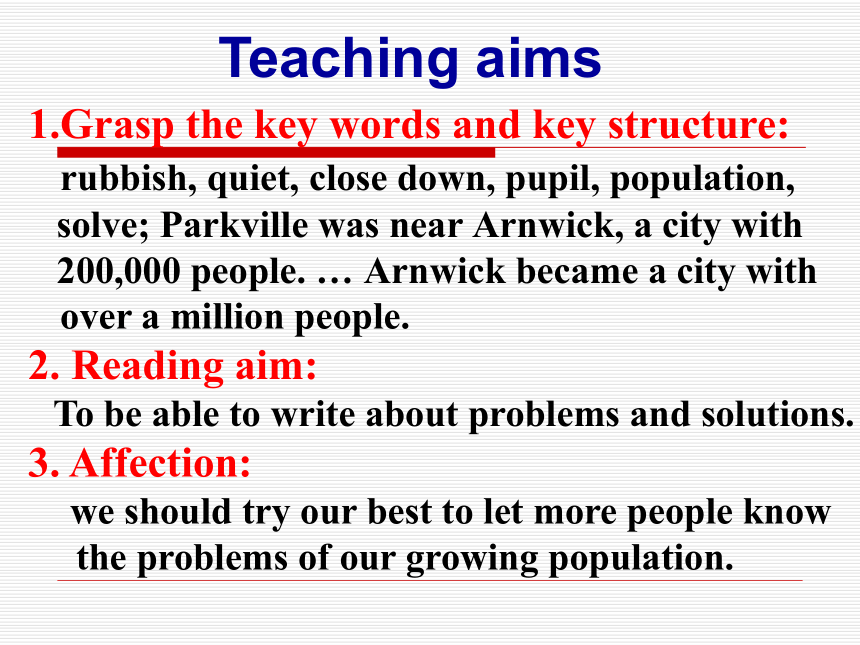
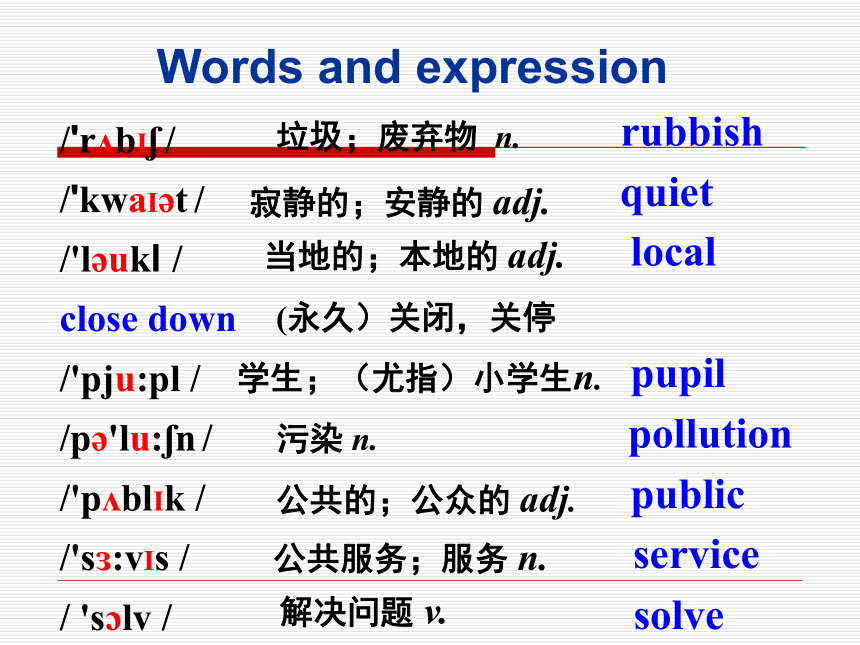
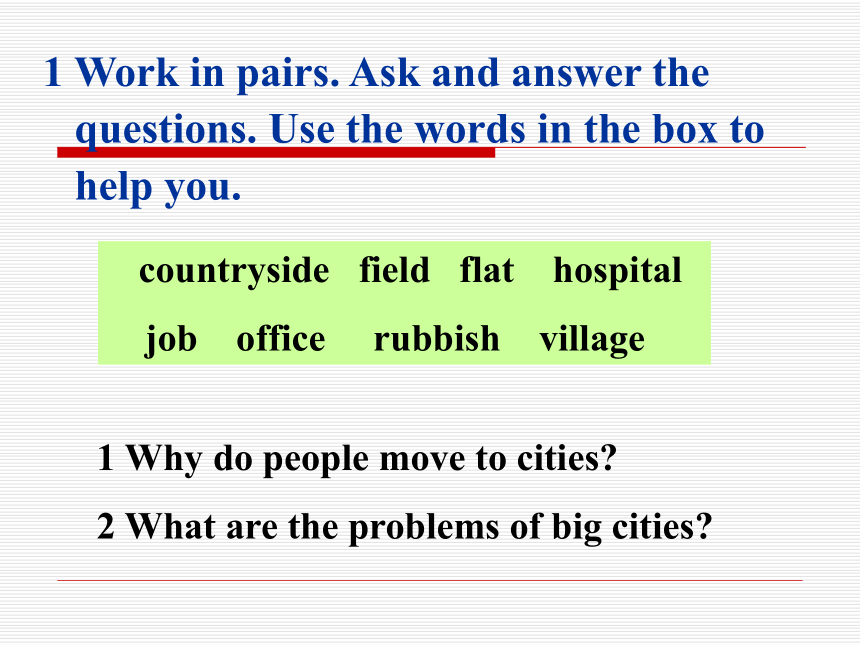

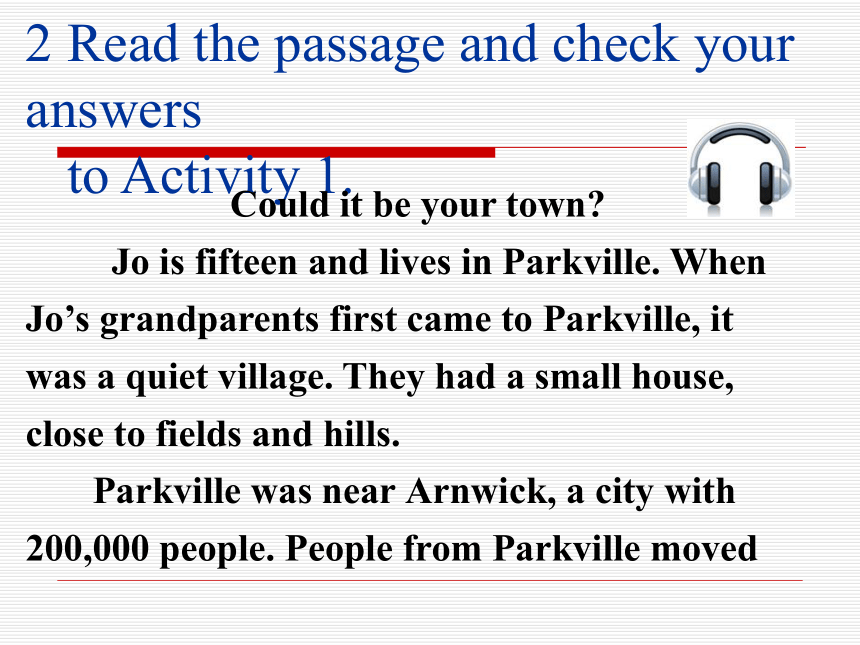
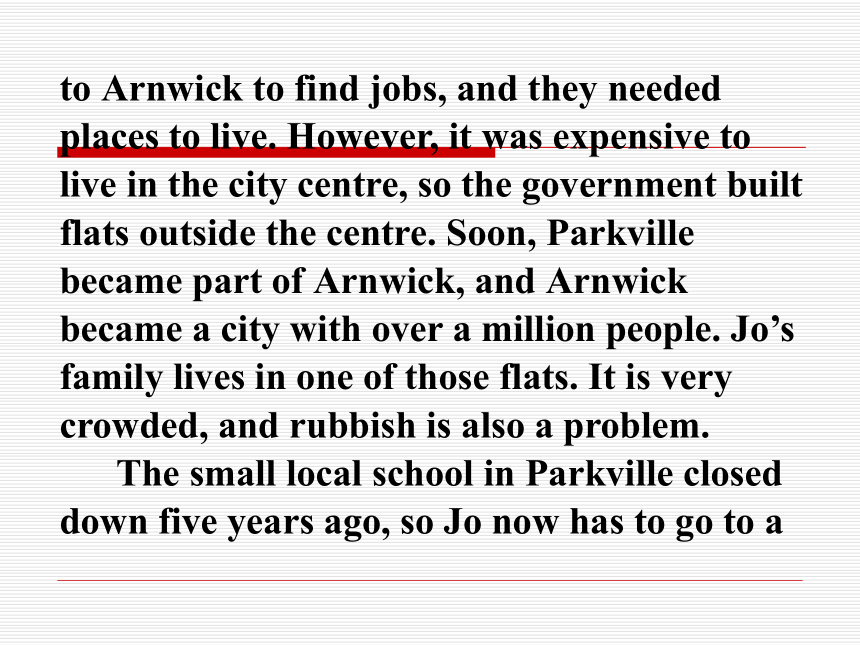
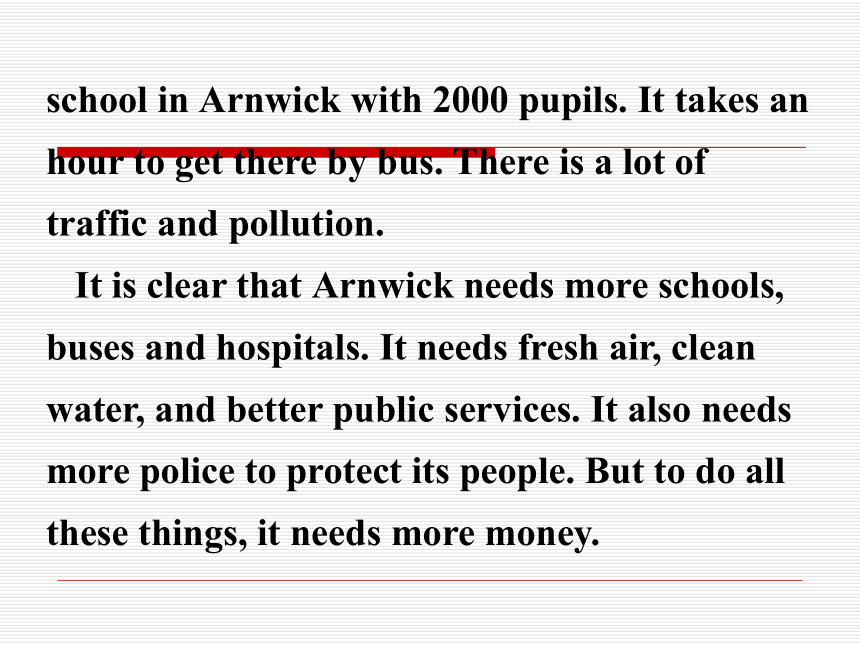
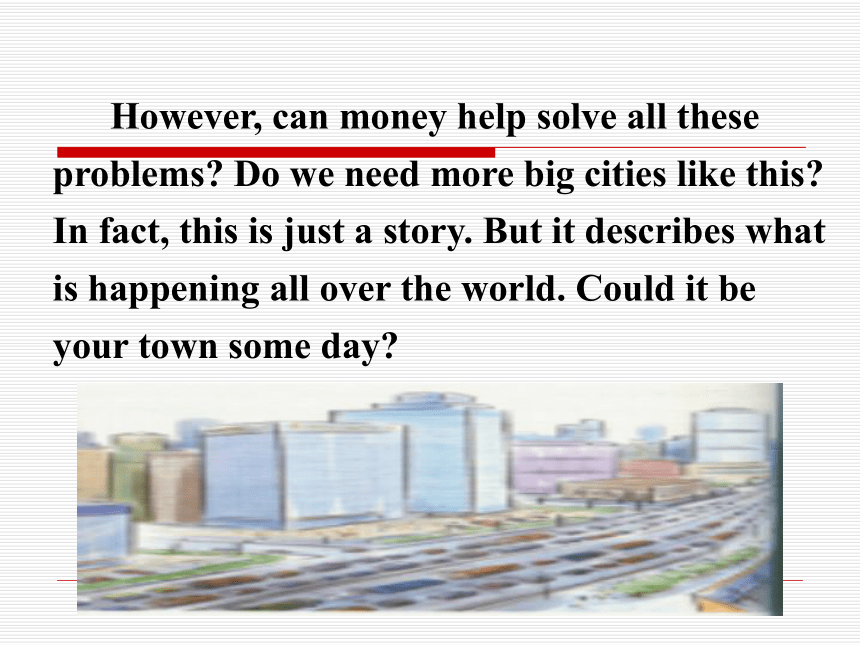
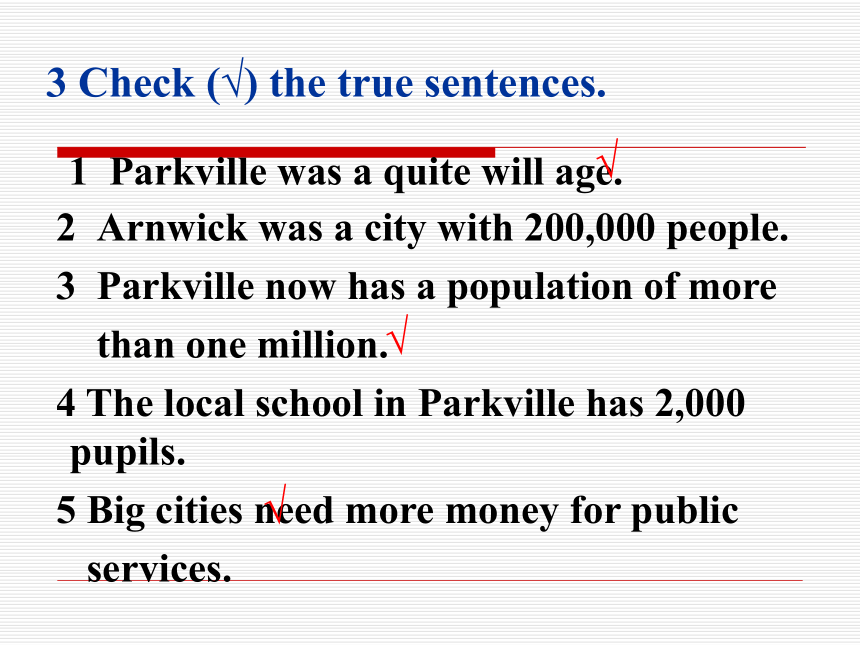
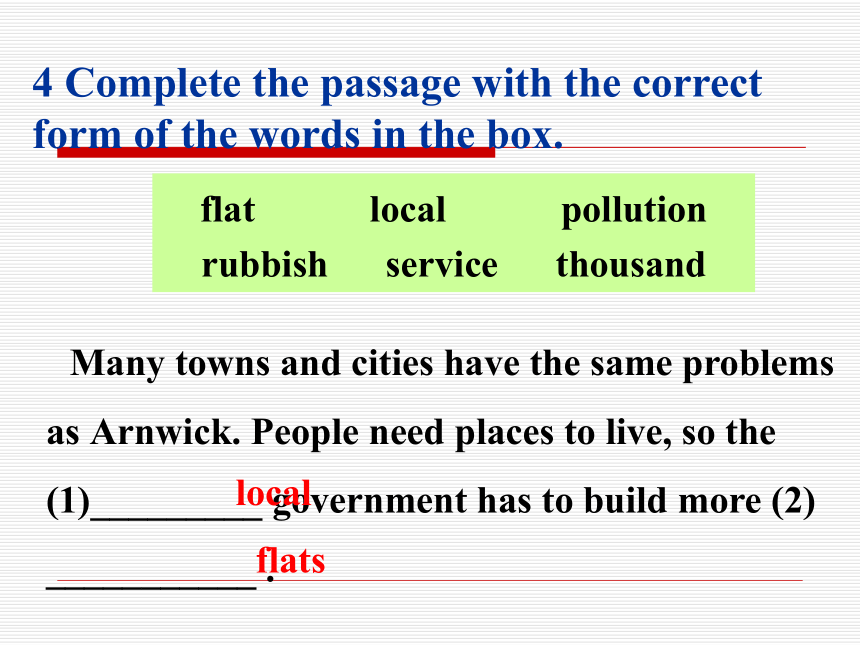
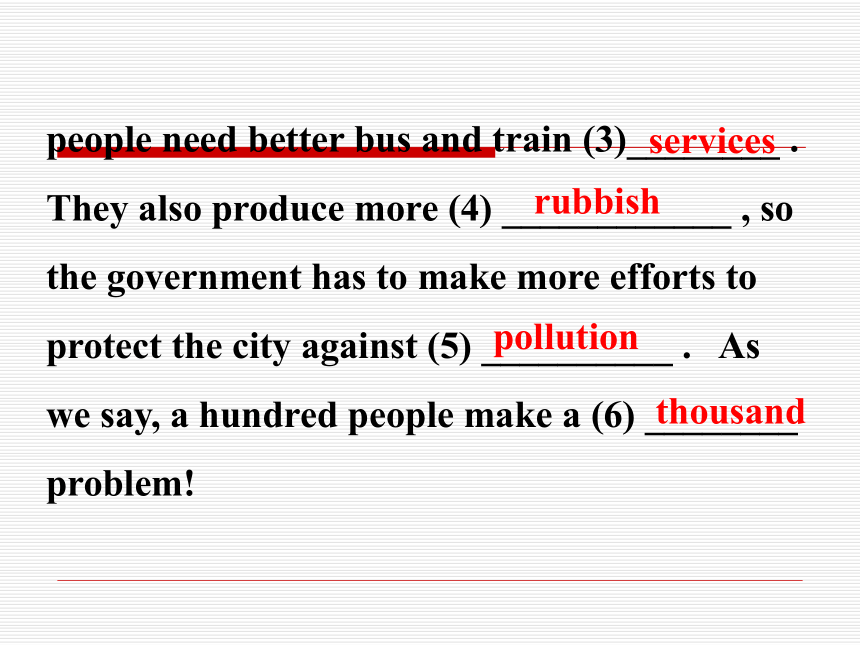
文档简介
课件33张PPT。9ModuleUnit 2
Arnwick was a city with 200,000 people. PopulationGrasp the key words and key structure:
rubbish, quiet, close down, pupil, population,
solve; Parkville was near Arnwick, a city with
200,000 people. … Arnwick became a city with over a million people.
2. Reading aim:
To be able to write about problems and solutions.
3. Affection:
we should try our best to let more people know
the problems of our growing population.
Teaching aims/'r?bI? /
/'kwaI?t /
/'l?ukl /
close down
/'pju:pl /
/p?'lu:?n /
/'p?blIk /
/'s?:vIs /
/ 's?lv /垃圾;废弃物 n.rubbish寂静的;安静的 adj.local当地的;本地的 adj.pupil(永久)关闭,关停quiet 学生;(尤指)小学生n.污染 n.public公共的;公众的 adj.pollution公共服务;服务 n. service解决问题 v.solveWords and expression1 Work in pairs. Ask and answer the
questions. Use the words in the box to
help you. countryside field flat hospital
job office rubbish village 1 Why do people move to cities?
2 What are the problems of big cities?Listen and read2 Read the passage and check your answers to Activity 1. Could it be your town?
Jo is fifteen and lives in Parkville. When Jo’s grandparents first came to Parkville, it was a quiet village. They had a small house, close to fields and hills.
Parkville was near Arnwick, a city with
200,000 people. People from Parkville moved to Arnwick to find jobs, and they needed places to live. However, it was expensive to live in the city centre, so the government built flats outside the centre. Soon, Parkville became part of Arnwick, and Arnwick became a city with over a million people. Jo’s family lives in one of those flats. It is very crowded, and rubbish is also a problem.
The small local school in Parkville closed down five years ago, so Jo now has to go to a school in Arnwick with 2000 pupils. It takes an hour to get there by bus. There is a lot of traffic and pollution.
It is clear that Arnwick needs more schools, buses and hospitals. It needs fresh air, clean water, and better public services. It also needs more police to protect its people. But to do all these things, it needs more money.
However, can money help solve all these problems? Do we need more big cities like this? In fact, this is just a story. But it describes what is happening all over the world. Could it be your town some day? 1 Parkville was a quite will age.
2 Arnwick was a city with 200,000 people.
3 Parkville now has a population of more
than one million.
4 The local school in Parkville has 2,000 pupils.
5 Big cities need more money for public
services.3 Check (√) the true sentences. √√√4 Complete the passage with the correct form of the words in the box. Many towns and cities have the same problems as Arnwick. People need places to live, so the (1)_________ government has to build more (2) ___________ . flat local pollution
rubbish service thousandlocalflatspeople need better bus and train (3)________ . They also produce more (4) ____________ , so the government has to make more efforts to protect the city against (5) __________ . As we say, a hundred people make a (6) ________ problem!servicesrubbishpollutionthousandWriting5 Read and check (√) the problems that exist in your hometown.( ) Many young people want to leave the
countryside because they want to find jobs
in the city.
( ) There are not enough schools and hospitals
in big cities.√√( ) Too much traffic brings air pollution.
( ) There is too much rubbish in the streets.
( ) There are not enough police in the city.
( ) It is difficult to get enough clean water.√√6 Write down your suggestions to solve the problems in Activity 5. tips1.基数词hundred thousand million 和 billion 之前有具体数字或者several, a few 修饰时,用单数five
several
a few+hundred
thousand
million
billionReview e.g. 1. I have told him hundreds of times.
2. There are thousands of tourists in the
Forbidden City.
tips
2. 当不具体指代的数量时,hundred, thousand, million, billion 要用复数,且和of 连用,也可被several,many等修饰。hundreds
thousands
millions
billions
+ofSeveral
many+Language points1 The population of China is about 1.37 million.中国的人口大约为1.37亿。
Billion的意思是“十亿”。中文常用的数字有:个、十、百、千、万。亿。请同学们注意,英语常用的数字单位与中文有所不同,为:hundred (百)、thousand (千)、million (百万)、billion (十亿)。2 Hang on a minute! I will write that down too!
等等,我要把这点也记下来!
hang on 这个动词短语常用来表示“让某人等一下。” 例如:
e.g. Sally’s on the other phone-would you like to
hang on?
萨莉在接另一个电话,请你稍等一下可以吗?
hang on! I’ll be back in a minute.
稍等!我马上就回来。3. The small local school in Parkville closed down five years ago, so Jo now has to go to a school in Arnwick with 2000 pupils.
帕科威尔当地的小学校在五年前关闭了,所以乔现在得去阿恩威克的一个有2000名学生的学校上学。
colse down 的意思是“关闭,(永久性地)停工”。 例如:
The company closed down its overseas office last year.
那家公司去年关闭了其海外的办事处。冠词练习题 1.?Tomorrow?is?_____?Teachers'?Day?and?we'll
make?______?card?for?our?English?teacher.?
2.?The?bus?is?running?about?seventy?miles___
hour.?
3.?Mary?is?interested?in?______?science.?
4.?Some?people?don't?like?to?talk?at?____?table.?
5.?Last?night?I?went?to_____?bed?very?late.?
6.?Don't?worry.?We?still?have?_____?little?time
left.? /aan///a100????????????????
2,000??????????????
30,000?????????????
400,000?????????????
5,000,000???????????? 60,000,000?????????? 700,000,000????????
8,000,000,000???????
90,000,000,000????????????????????
100,000,000,000?
236,785,462,503???Can you read them ?hundred?thousand?millionbillionOne hundredTwo thousandThirty thousandFour hundred thouandFive millionSixty millionSeven hundred millionEight billion Ninety billionOne hundred billionTwo hundred million, seven hundred and eghty-five, four hundred and sixty-two, five hundred and threeone?hundred
one?thousand
ten?thousand
one?hundred?thousand
one?million
ten?million
one?hundred?million?????
one?billion
ten?billion
one?hundred?billion
tens/ hundreds/thousands/
millions of
一百????? ????????????????????
?一千 ???????????
?一万 ????????????????????????????????????????????
十万? ?????
一百万???? ??????????????????
一千 万 ????????????????????????
?一亿 ???????
?十亿 ?????????????
?一百亿?? ? ???????????????? 一千亿
数十/百/千/百万看谁译得快: 单项选择。1.?I?read?____story.?It?is?______interesting?story.?
A.?a,?an?B.?a,?a?C.?the,?the?D.?the,?an?
2.?Britain?is?__?European?country?and?China?is
?___?Asian?country.?
A.?an,?an? B.?a,?a? C.?a,?an? D.?an,?a?
3.?______China?is?_____?old?country?with?_____?
long?history.?
A.?The,?an,?a?B.?The,?a,?a?C.?/,?an,?the?D.?/,?an,?a?AAD4.?_____elephant?is?bigger?than?______?horse.?
A.? /,?/? B. ?an,?a? C. ?An,?a? D.?/,?the?
5.?We?always?have?______rice?for?______lunch.?
A.?/,?/? B.?the,?/? C.?/,?a? D.?the,?the?
6.?It?took?me?______?hour?and?_____?half?to?
finish?______?work.?
A.?a,?a,?a? B.?an,?a,?a?
C.?an,?a,?the? D.?an,?a,?/?BAC7.?____?doctor?told?me?to?take?___medicine?
three?times?_____day,?stay?in?____bed,?then?
I?would?be?better?soon.?
A.?/,?a,?a,?the? B.?A,?the,?the,?/?
C.?The,?the,?a,?/? D.?A,?/,?a,?/?
8.?There?is?____?picture?on?____?wall.?I?like?___
picture?very?much.?
A.?a,?the,?the? B.?a,?the,?a?
C.?the,?a,?a? D.?a,?an,?the?
9.?January?is?______first?month?of?the?year.?
A.?a? B.?/ ?C.?an ?D.?the? CAD10.?Shut?_____door,?please.?
A.?a? B.?an? C.?the? D./?
11.?Einstein?won?_____?Nobel?Prize?in?Physics
?in?1921.?
A.?a? B.?an? C.?the? D.?/?
12.?What?____?fine?day?it?is?today!?Let's?go?to?
the?Summer?Palace.?
A.?a? B.?an? C.?the? D.?/?
CCAHomework 用英语读写下列数字。
a. 367
b. 8 900
c. 5 002
d. 5 563
e. 2 456 000
f. 6 453 781Do you know?格陵兰岛是世界最大的岛屿。在北美洲东北,北冰洋和大西洋之间。面积217.56万平方千米。人口5.4万(1982),主要分布在西部和西南部,因纽特(爱斯基摩)人占多数。 世界第一长河——尼罗河(Nile),非洲主河流之父,位于非洲东北部,是一条国际性的河流。尼罗河发源于赤道南部的东非高原上的布隆迪高地,干流流经布隆迪、卢旺达、坦桑尼亚、乌干达、苏丹和埃及等国,最后注入地中海。干流自卡盖拉(Kagara)河源头至入海口,全长6670km,是世界流程最长的河流。支流还流经肯尼亚、埃塞俄比亚和刚果(金)、厄立特里亚等国的部分地区。流域面积约287万km2,占非洲大陆面积的九分之一以上。入海口处年平均径流量810亿m3。
Arnwick was a city with 200,000 people. PopulationGrasp the key words and key structure:
rubbish, quiet, close down, pupil, population,
solve; Parkville was near Arnwick, a city with
200,000 people. … Arnwick became a city with over a million people.
2. Reading aim:
To be able to write about problems and solutions.
3. Affection:
we should try our best to let more people know
the problems of our growing population.
Teaching aims/'r?bI? /
/'kwaI?t /
/'l?ukl /
close down
/'pju:pl /
/p?'lu:?n /
/'p?blIk /
/'s?:vIs /
/ 's?lv /垃圾;废弃物 n.rubbish寂静的;安静的 adj.local当地的;本地的 adj.pupil(永久)关闭,关停quiet 学生;(尤指)小学生n.污染 n.public公共的;公众的 adj.pollution公共服务;服务 n. service解决问题 v.solveWords and expression1 Work in pairs. Ask and answer the
questions. Use the words in the box to
help you. countryside field flat hospital
job office rubbish village 1 Why do people move to cities?
2 What are the problems of big cities?Listen and read2 Read the passage and check your answers to Activity 1. Could it be your town?
Jo is fifteen and lives in Parkville. When Jo’s grandparents first came to Parkville, it was a quiet village. They had a small house, close to fields and hills.
Parkville was near Arnwick, a city with
200,000 people. People from Parkville moved to Arnwick to find jobs, and they needed places to live. However, it was expensive to live in the city centre, so the government built flats outside the centre. Soon, Parkville became part of Arnwick, and Arnwick became a city with over a million people. Jo’s family lives in one of those flats. It is very crowded, and rubbish is also a problem.
The small local school in Parkville closed down five years ago, so Jo now has to go to a school in Arnwick with 2000 pupils. It takes an hour to get there by bus. There is a lot of traffic and pollution.
It is clear that Arnwick needs more schools, buses and hospitals. It needs fresh air, clean water, and better public services. It also needs more police to protect its people. But to do all these things, it needs more money.
However, can money help solve all these problems? Do we need more big cities like this? In fact, this is just a story. But it describes what is happening all over the world. Could it be your town some day? 1 Parkville was a quite will age.
2 Arnwick was a city with 200,000 people.
3 Parkville now has a population of more
than one million.
4 The local school in Parkville has 2,000 pupils.
5 Big cities need more money for public
services.3 Check (√) the true sentences. √√√4 Complete the passage with the correct form of the words in the box. Many towns and cities have the same problems as Arnwick. People need places to live, so the (1)_________ government has to build more (2) ___________ . flat local pollution
rubbish service thousandlocalflatspeople need better bus and train (3)________ . They also produce more (4) ____________ , so the government has to make more efforts to protect the city against (5) __________ . As we say, a hundred people make a (6) ________ problem!servicesrubbishpollutionthousandWriting5 Read and check (√) the problems that exist in your hometown.( ) Many young people want to leave the
countryside because they want to find jobs
in the city.
( ) There are not enough schools and hospitals
in big cities.√√( ) Too much traffic brings air pollution.
( ) There is too much rubbish in the streets.
( ) There are not enough police in the city.
( ) It is difficult to get enough clean water.√√6 Write down your suggestions to solve the problems in Activity 5. tips1.基数词hundred thousand million 和 billion 之前有具体数字或者several, a few 修饰时,用单数five
several
a few+hundred
thousand
million
billionReview e.g. 1. I have told him hundreds of times.
2. There are thousands of tourists in the
Forbidden City.
tips
2. 当不具体指代的数量时,hundred, thousand, million, billion 要用复数,且和of 连用,也可被several,many等修饰。hundreds
thousands
millions
billions
+ofSeveral
many+Language points1 The population of China is about 1.37 million.中国的人口大约为1.37亿。
Billion的意思是“十亿”。中文常用的数字有:个、十、百、千、万。亿。请同学们注意,英语常用的数字单位与中文有所不同,为:hundred (百)、thousand (千)、million (百万)、billion (十亿)。2 Hang on a minute! I will write that down too!
等等,我要把这点也记下来!
hang on 这个动词短语常用来表示“让某人等一下。” 例如:
e.g. Sally’s on the other phone-would you like to
hang on?
萨莉在接另一个电话,请你稍等一下可以吗?
hang on! I’ll be back in a minute.
稍等!我马上就回来。3. The small local school in Parkville closed down five years ago, so Jo now has to go to a school in Arnwick with 2000 pupils.
帕科威尔当地的小学校在五年前关闭了,所以乔现在得去阿恩威克的一个有2000名学生的学校上学。
colse down 的意思是“关闭,(永久性地)停工”。 例如:
The company closed down its overseas office last year.
那家公司去年关闭了其海外的办事处。冠词练习题 1.?Tomorrow?is?_____?Teachers'?Day?and?we'll
make?______?card?for?our?English?teacher.?
2.?The?bus?is?running?about?seventy?miles___
hour.?
3.?Mary?is?interested?in?______?science.?
4.?Some?people?don't?like?to?talk?at?____?table.?
5.?Last?night?I?went?to_____?bed?very?late.?
6.?Don't?worry.?We?still?have?_____?little?time
left.? /aan///a100????????????????
2,000??????????????
30,000?????????????
400,000?????????????
5,000,000???????????? 60,000,000?????????? 700,000,000????????
8,000,000,000???????
90,000,000,000????????????????????
100,000,000,000?
236,785,462,503???Can you read them ?hundred?thousand?millionbillionOne hundredTwo thousandThirty thousandFour hundred thouandFive millionSixty millionSeven hundred millionEight billion Ninety billionOne hundred billionTwo hundred million, seven hundred and eghty-five, four hundred and sixty-two, five hundred and threeone?hundred
one?thousand
ten?thousand
one?hundred?thousand
one?million
ten?million
one?hundred?million?????
one?billion
ten?billion
one?hundred?billion
tens/ hundreds/thousands/
millions of
一百????? ????????????????????
?一千 ???????????
?一万 ????????????????????????????????????????????
十万? ?????
一百万???? ??????????????????
一千 万 ????????????????????????
?一亿 ???????
?十亿 ?????????????
?一百亿?? ? ???????????????? 一千亿
数十/百/千/百万看谁译得快: 单项选择。1.?I?read?____story.?It?is?______interesting?story.?
A.?a,?an?B.?a,?a?C.?the,?the?D.?the,?an?
2.?Britain?is?__?European?country?and?China?is
?___?Asian?country.?
A.?an,?an? B.?a,?a? C.?a,?an? D.?an,?a?
3.?______China?is?_____?old?country?with?_____?
long?history.?
A.?The,?an,?a?B.?The,?a,?a?C.?/,?an,?the?D.?/,?an,?a?AAD4.?_____elephant?is?bigger?than?______?horse.?
A.? /,?/? B. ?an,?a? C. ?An,?a? D.?/,?the?
5.?We?always?have?______rice?for?______lunch.?
A.?/,?/? B.?the,?/? C.?/,?a? D.?the,?the?
6.?It?took?me?______?hour?and?_____?half?to?
finish?______?work.?
A.?a,?a,?a? B.?an,?a,?a?
C.?an,?a,?the? D.?an,?a,?/?BAC7.?____?doctor?told?me?to?take?___medicine?
three?times?_____day,?stay?in?____bed,?then?
I?would?be?better?soon.?
A.?/,?a,?a,?the? B.?A,?the,?the,?/?
C.?The,?the,?a,?/? D.?A,?/,?a,?/?
8.?There?is?____?picture?on?____?wall.?I?like?___
picture?very?much.?
A.?a,?the,?the? B.?a,?the,?a?
C.?the,?a,?a? D.?a,?an,?the?
9.?January?is?______first?month?of?the?year.?
A.?a? B.?/ ?C.?an ?D.?the? CAD10.?Shut?_____door,?please.?
A.?a? B.?an? C.?the? D./?
11.?Einstein?won?_____?Nobel?Prize?in?Physics
?in?1921.?
A.?a? B.?an? C.?the? D.?/?
12.?What?____?fine?day?it?is?today!?Let's?go?to?
the?Summer?Palace.?
A.?a? B.?an? C.?the? D.?/?
CCAHomework 用英语读写下列数字。
a. 367
b. 8 900
c. 5 002
d. 5 563
e. 2 456 000
f. 6 453 781Do you know?格陵兰岛是世界最大的岛屿。在北美洲东北,北冰洋和大西洋之间。面积217.56万平方千米。人口5.4万(1982),主要分布在西部和西南部,因纽特(爱斯基摩)人占多数。 世界第一长河——尼罗河(Nile),非洲主河流之父,位于非洲东北部,是一条国际性的河流。尼罗河发源于赤道南部的东非高原上的布隆迪高地,干流流经布隆迪、卢旺达、坦桑尼亚、乌干达、苏丹和埃及等国,最后注入地中海。干流自卡盖拉(Kagara)河源头至入海口,全长6670km,是世界流程最长的河流。支流还流经肯尼亚、埃塞俄比亚和刚果(金)、厄立特里亚等国的部分地区。流域面积约287万km2,占非洲大陆面积的九分之一以上。入海口处年平均径流量810亿m3。
同课章节目录
- Module 1 How to learn English
- Unit 1 Let's try to speak English as much as possi
- Unit 2 You should smile at her.
- Unit 3 Language in use .
- Module 2 My home town and my country
- Unit 1 It's taller than many other buildings.
- Unit 2 Cambridge is a beautiful city in the east o
- Unit 3 Language in use .
- Module 3 Sports.
- Unit 1 Nothing is more exciting than playing tenni
- Unit 2 This year we training more carefully.
- Unit 3 Language in use .
- Module 4 Planes, ships and trains .
- Unit 1 He lives the farthest from school.
- Unit 2 What is the best way to travel.
- Unit 3 Language in use .
- Module 5 Lao She Teahouse.
- Unit 1 I wanted to see the Beijing Opera.
- Unit 2 It descibes the changes in Chinese society.
- Unit 3 Language in use .
- Module 6 Animals in danger.
- Unit 1 It allows people to get closer to them .
- Unit 2 The WWF is working hard to save them all.
- Unit 3 Language in use .
- Revision module A
- Module 7 A famous story
- Unit 1 Alice was sitting with her sister by the ri
- Unit 2 She was thinking about her cat.
- Unit 3 Language in use .
- Module 8 Accidents
- Unit 1 While the car were changing to red, a car s
- Unit 2 I was trying to pick it up when it bite me
- Unit 3 Language in use .
- Module 9 Population
- Unit 1 The population of China is about 1.37 billi
- Unit 2 Arnwick was a city with 200,000 people.
- Unit 3 Language in use .
- Module 10 The weathe
- Unit 1 It might snow.
- Unit 2 The weather is fine all year round.
- Unit 3 Language in use .
- Module 11 Way of life
- Unit 1 In China ,we open a gift later.
- Unit 2 In England, you usually drink tea with milk
- Unit 3 Language in use .
- Module 12 Help
- Unit 1 What should we do before help arrives?
- Unit 2 Stay away from windows and heavy furniture.
- Unit 3 Language in use .
- Revision module B
